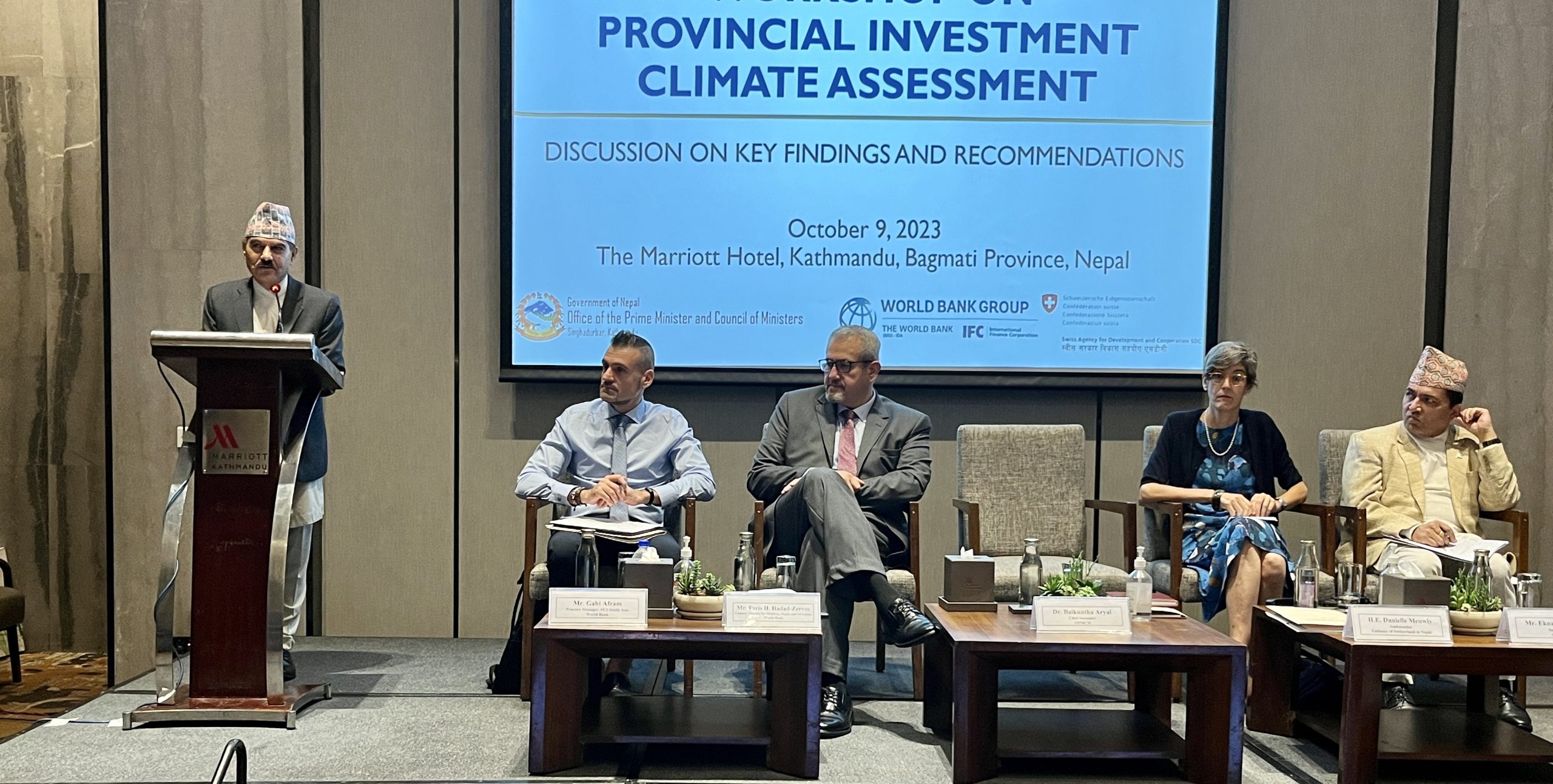Govt expresses commitment to boost investment climate in provinces

KATHMANDU: The Government of Nepal has committed to develop Provincial Investment Climate Reform Action Plans across all provinces, beginning with the Koshi, Madhesh, Gandaki, and Lumbini provinces to stimulate investments at the subnational level.
These plans will identify important reforms based on Provincial Investment Climate Assessments (PICA) conducted in the four provinces to help create an investment-friendly environment and promote private sector investment at the provincial and local levels. This new initiative will also be extended to the remaining three provinces of Bagmati, Karnali, and Sudurpashchim over the course of the Fiscal Year.
The announcement was made at a workshop on PICA organized by the Office of the Prime Minister and Council of Ministers with the support of the World Bank, Swiss Agency for Development and Cooperation (SDC), and the International Finance Corporation on October 9, 2023.
“PICA will help us to get disaggregated data on investment climate at provincial level and offers necessary data for shaping evidence informed policies at local level. It suggests some policy alternatives for potential transformation of Nepal’s business environment,” expressed Dr. Baikuntha Aryal, Chief Secretary of the Government of Nepal. “We need to internalize the framework, ensure effective policy coordination, simplify and harmonize policies and develop understanding of priority reform agenda among all state actors to improve Nepal’s business environment”.
The workshop was organized under the World Bank and SDC-financed Post-Covid Private Sector Recovery Technical Assistance (TA) Program (PSRP). It discussed the findings from the PICA and the strategic actions needed for the formulation of Provincial Investment Climate Reform Action Plans, drawing upon the insights derived from the assessment report.
“PICA will, for the first time, provide insights in terms of the readiness of provinces to attract investment and support private sector growth,” mentioned Her Excellency Danielle Meuwly, Ambassador of Switzerland to Nepal. “PICA’s effort is a much welcome step in Nepal’s federalized context. We need to support the ongoing devolution of federal power and promote collaboration between national and sub national authorities. By fostering businesses and private investment, we are ultimately working to achieve Nepal’s aspiration of becoming a middle-income country.”
PICA offers an evidence-based assessment to help policymakers at the provincial and local governments identify important policy changes that affect investment environment and competitiveness. It assesses the investment climate across 18 indicators divided into four pillars: Basic Infrastructure, Regulatory Efficiency, Regulatory Transparency and Firm Engagement, and Quality of Life.
The PICA was undertaken initially in four provinces and municipalities – Koshi (Biratnagar), Madhesh (Birgunj), Gandaki (Pokhara), and Lumbini (Siddharthanagar). The preparation of the PICA will commence in the remaining provinces later this calendar year.
“A conducive climate for robust private sector participation and investment in cities within and outside Kathmandu Valley is central to Nepal’s economic growth,” said Faris Hadad-Zervos, World Bank Country Director for Maldives, Nepal, and Sri Lanka. “Subnational policy makers play an important role in targeting reforms and action plans towards mobilizing greater private investments and creating job opportunities for people at federal, provincial, and local levels.”
The workshop also included a panel discussion on ‘Investment Climate Reforms in Provinces: Possibilities and Way Forward’ where panelists delved into governance issues, the significance of public-private dialogue in reform implementation, and the impact of infrastructure development on enhancing the investment climate.
Eknarayan Aryal, Secretary of the Office of the Prime Minister and Council of Ministers, highlighted the importance of inter-government coordination for effective implementation of PICA reform activities and stressed the significance of the private sector’s role in the industrialization of Nepal’s economy. The workshop was attended by secretaries and joint secretaries from federal ministries, principal secretaries and secretaries from the provincial governments, chief administrative officers from the pilot local governments, development partners, and private sector representatives.












Facebook Comment